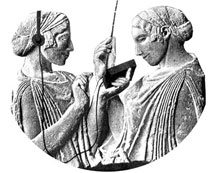Schola Latína
Európæa & Úniversális
Latiné loqui disce sine molestiá!
Learn to speak Latin with ease! ¡Aprende a hablar latín sin esfuerzo!
Apprenez à parler latin sans peine! Impara a parlare latino senza sforzo! Lernen Sie latein zu sprechen ohne Mühe!
***
Dé vocábulís discendís
by A. Gratius G.F.V. Avitus
Vocabulary, on the other hand, is infinite, extravagantly infinite. It is vocabulary that occupies the thousands of pages of dictionaries. It’s lack of familiarity with the vocabulary, not with the declensions or the conjugations, that doesn’t allow you to put into Latin that idea you would like to express, or to understand that Latin text you would like to read. It’s vocabulary you need to learn if you want to learn Latin 1.
Fortunately, it so happens that we, as human beings, are all programmed by nature to do just that: learn vocabulary. From a very early age we have the innate ability to listen to the sounds that words are made of and to link those sounds to concepts. There is nothing more natural to humans than that process. All we need is to listen, to be exposed to those sounds (which is what the Assimil tapes do for you), of course in a context where we can link those sounds to the concepts they refer to (which is what the Assimil book provides). That’s why just listening to the tapes (sounds) while understanding with the aid of the book (concepts) is the way to naturally learing vocabulary, and hence the language, without strenuous effort of memory.
--------------
1 Even most of grammar can be put down to vocabulary, as you don’t need to know what an adversative clause is in order to learn that the item of vocabulary ‘sed’ means just ‘but’. I for one have never learnt the dozens of different types of datives that grammar books list for you (dative of personal interest, ethical dative, dative of reference, dative of object for which, and all that jazz) in order to know that ‘consuli’ means ‘to or for the consul’ and nothing else, for that’s all I’ve ever needed to know about the dative in order to speak and read Latin with complete fluency.
Reinforcing vocabulary
The only difference between this and the natural way of learning a language, is that, when we are little, we have plenty of time to spare, and now we want to learn a bit more time-efficiently. Listening to the tape repeatedly works towards that aim nicely; but if anyone wants to put that extra bit of effort, then I have found, in my many years of language learning and my more than a decade of language teaching, that vocabulary-cards are, following extensive intelligent listening, the best method to reinforce vocabulary.
Vocabulary-cards constitute an excellent tool to learn and review large numbers of words in surprisingly little time with maximum efficiency.
Vocabulary-cards can be bought from bookshops, but they are very easy to make, and by making them yourself, you will be able to choose the items of vocabulary that you want to study and personalise them to suit your aims best.
1. You need to have some DIN A4 pages —100 will give you 1,600 cards— cut into 16 pieces. You can do this yourself with a guillotine or other cutting tool, or, better, have it done for you at a print shop:

2. You then write the word in Latin on one side of the card:

3. Making the card rotate around an imaginary horizontal axis —you will realize that this makes it easier to go through the cards than if you rotate them vertically—, you write the meaning of the word on the other side —do not write more than one or two meanings for each word 2—:

Always have blank cards at hand when you study, but please don’t make a card for every word in the book; write a card only for those words that look more difficult or that you have a feeling you are less likely to remember next time. Trust your instincts.
----------------
2 Of course you should also be reassured that words have far fewer meanings than your average dictionary will have you believe.
1. Take a number of cards (20 to 50) and go through them with the Latin facing up. Try to guess the meaning of the words, and then check it by turning the card.
a) If you guessed rightly, lay it aside.
b) If you guessed wrongly, make an effort (two seconds) to memorize the right answer, and put the card back at the end of the set still in your hands.
2. When you have gone through all the cards once, and end up facing the first one you guessed wrongly, shuffle them, and start again —with only those that remain in your hand, i.e. the cards you did not guess!—. Do this until you end up with no cards in your hands, having guessed all of them right and so laid them aside.
3. Then take all the set again, shuffle it, and repeat the same procedure, looking now at the vernacular and trying to guess the Latin.
4. After a few days, repeat the operation.
Do not keep the cards for long. Once you have reviewed them for a couple of times throw them away. If you ever come across one of those words and do not remember its meaning —highly unlikely—, you will do better to write a new card for it.


